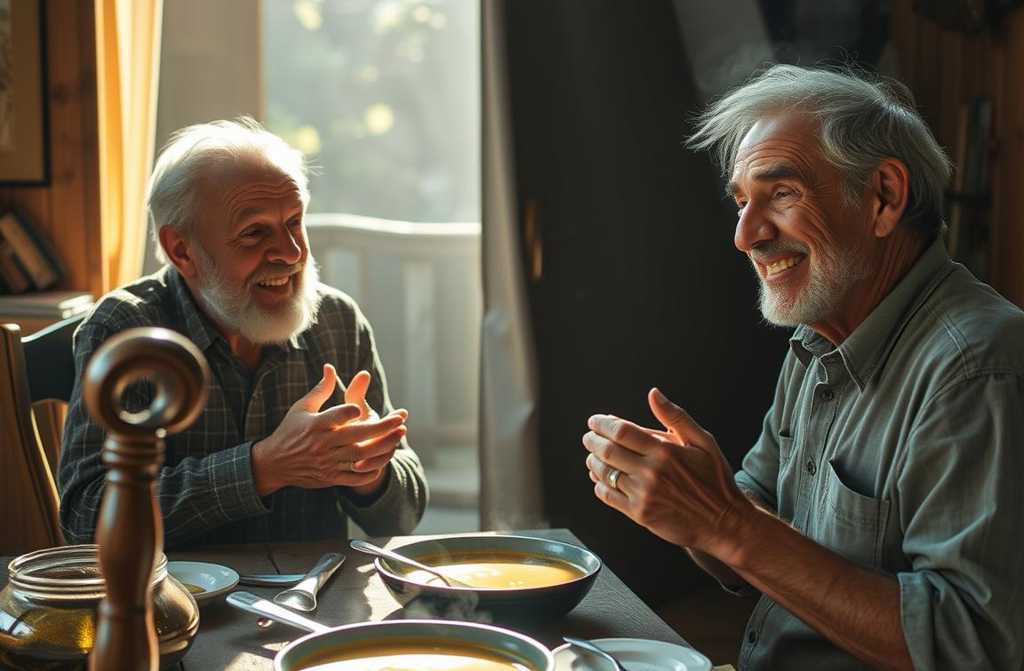Seven long years had passed since the earth swallowed Lydias body. Seven years of silence, ringing louder than any music in his ears, and loneliness that had seeped into the walls of the house like the scent of woodsmoke. Stepheneveryone called him Steviewas left alone at sixty-three. Not old, but no longer young either, stuck between two shores: behind him, a life full of love and storms; ahead, only the quiet, joyless drift toward an inevitable end.
God hadnt cheated him on healthhis body, hardened by years of labour, still held strength, but his soul was broken and hollow. Lydia had faded slowly, painfully, and hed cared for her till her last breath, till the final tear on her gaunt cheek. And then she was gone, leaving him alone in this wide world. The Lord hadnt blessed them with children, so theyd lived soul to soul in their own little universe, bound by the edges of their village.
Hed grown used to Lydia being the sun of his small planet. She was the warmth that heated the house, the light that filled it with comfort. Her hands cooked the richest stews, baked pies with pastry so light it melted on the tongue. She ran the householdthe dairy cow, the chickens, a calf fattened each year so theyd have their own meat in winter. The vegetable patch was her kingdom, ruled by perfect rows of carrots, onions, and potatoes. His work was the heavy labourploughing, digging, fixing whatever broke. He was the outer wall of their fortress; she was its heart and soul.
A man gets used to anything. Stevie got used to the silence. At first, it pressed on him, rang in his ears, made him flinch at every creak of the floorboards. Then it became background noise. Boring? Yes. Unbearably empty? Absolutely. But what could he do? That was fates will, and you couldnt fight it.
The local women, of course, had taken notice. Stevie was a sturdy man, a good provider, his house well-kept, and with no heirswhich in the village was almost like winning the lottery. Matchmakers came hinting; some, still young enough, outright offered to “start a family.” But he brushed them all off like bothersome flies.
“I miss my Lydia,” hed explain to the villagers, staring past their heads into the empty air. “Shes watching from up there. She wouldnt like it if I brought another woman into her home. Wouldnt want her memory overshadowed.”
But in the quiet of his own thoughts, he reasoned differently: “To live together, thered have to be at least a spark. A drop of affection. And there isnt. Maybe Im not ready yet. My soul hasnt moved on.”
After his wifes death, hed sold the cowwhat use was so much milk to one man? That good brown cow had given two buckets a day. He sold her to a neighbour, his heart clenching as if hed betrayed another living thing tied to Lydia. But he kept raising a calf each summerfor meat. Thats how he lived: his own meat, his own eggs, milk bought or given out of pity by Annie next door, who looked at him with silent sympathy.
Stevie walked with a limp. Years ago, a stubborn horse had broken his leg. The bone set crooked, but hed shrugged it offno time to fuss. The limp became part of him, and in recent years, hed taken up a walking stickoak, carved, a gift from Lydia. No one noticed his unsteady gait anymore; it was just how things were.
That day, he sat alone at the dinner table, ladling freshly made stew into a deep bowl. Summer heat hung thick, the air shimmering over the land. The back door stood wide open, letting in lazy waves of scorching air. Suddenly, a shadow crossed the rectangle of sunlight on the floor.
“Alright, Stevie? Just popped indoor was open, so I let myself in!” boomed the voice of Tom, his neighbour two doors down, loud as a church bell. Tom was younger, full of restless energy and plans Stevie couldnt fathom.
“Alright,” Stevie grunted. “Fancy some stew? Just off the stove. Chop some spring onions inwont regret it. Keep me company.”
“Course I will! Love your stew! Hot as it is, theres nothing like it. Well cool off after!”
As he wolfed it down, Tom eyed Stevie sidelong, sharp as a fox.
“Listen, Stevie, you ought to remarry. No life for a man, stuck by the stove alone. A womand cook your stew, warm your bed, and well, you know.”
“You playing matchmaker now?” Stevie chuckled. “Found me a bride, have you?”
“Whats wrong with that? How long you gonna mope in widows weeds? Youre a catchcould have your pick of the ladies!”
“A womans not just for having,” Stevie said quietly but firmly. “Got to be right. Souls have to fit. One look, and you know.”
“Oh, souls!” Tom waved a hand. “Youre past seventy! Whats souls got to do with it? At your age, its about having someone thereto fetch your tea, tend to you. Think ahead!”
“Ahead?” Stevie set his spoon down and looked Tom square in the eye. “You think Im some doddering old fool, ready to shack up with the first woman wholl have me? No, Tom. I can still choose. And Ill live as I please.”
“Didnt mean it like that! No offence,” Tom backpedalled. “Just looking out for you! Thats why I brought it up. Got an aunt, seeAgatha. Lives over in Millfield. Firecracker of a woman! Not old, sharp as a tack. Keeps pigs, geese, a calf. Built sturdy, too. Names Agathaproper English. Went to see her last week. Full of life, but lonely. Fancy a visit? Take a look. Like what you seejob done. Bring her back here. Eh?”
“Whats in a name?” Stevie sighed. “Sharing a roof means sharing a life. Modern women love themselves more than work. Shed want to dig potatoes, tend livestock? These days they want pampering, carrying about. Im no young buck. And at my age, wife-huntings just undignified.”
“Ah, dont be daft! Ill come with. Shes familywed be proper kin! You know me, I know you. Wed get on like a house on fire!”
Talk dragged on till evening. Wearied by the push and his own flicker of curiosity, Stevie gave in. Theyd go in two days, Saturday, in Toms battered old Rover.
When Tom left, Stevie stood in the tomb-like silence. The idea of remarrying, vague before, now had weight. He scanned his home and saw it anewdust on the windowsills cluttered with junk, jars, nails, dried leaves Lydia once gathered. The floor, long unscrubbed. A mountain of unwashed dishes.
Next morning, he rose at dawn, driven by some inner whip. He wiped the dust, ruthlessly tossed the clutter. Scrubbed the floor, and the smell of freshness oddly lifted him. Then the dishes. Found an old bottle of soap, squeezed out froth thick with scent.
“Blimey,” he thought, watching plates gleam under the tap. “Almost cheerful. Might as well do the mugs. Havent tidied like this in ages.”
Saturday morning, Tom honked outside. Stevie wore his only good suitstill decent, though it smelled of mothballs and the past. The road was long and bumpy. They arrived by noon.
Toms car stopped by a leaning but sturdy fence. A woman stepped out at oncepleasant-faced, mid-fifties, a good decade younger than Stevie. Her smile was broad, oddly rehearsed.
“There you are! Ive waited ages, dinners gone cold! What kept you?” she called before shed reached them.
And with those words, that over-familiar tone, Stevies insides turned cold. He knewhed been promised already, without his say. His hand twitched toward the door handle, ready to order Tom to turn back. But then he heard her whisper to her nephew:
“Hes not crippled, is he?” Her eyes flicked to his stick.
“No, Aunt Agatha, just an old leg break, walks a bit funny. Nothing serious,” Stevie said stiffly.
She stepped closer, offered a hand. Her palm was unexpectedly warm and soft, as if it had never known hard work.
“Welcome, love, so pleased to meet you. Im Agatha,” she said sweetly.
He shook her fingers awkwardly.
“Afternoon. Stephen or Stevie, if you like.”
A glance at her yard showed neat rows, a freshly whitewashed shed, not a weed in sight. “Hard worker,”







